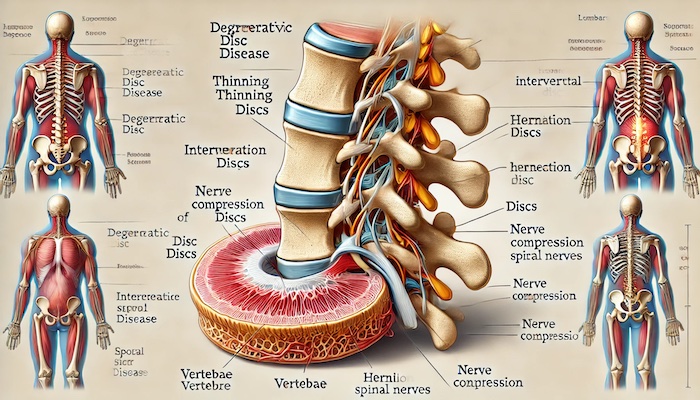
Degenerative Disc Disease (DDD) is a common yet often misunderstood condition that affects millions of people worldwide. At Precision Pain Care and Rehabilitation, we aim to provide our patients with a thorough understanding of DDD and how interventional pain management can effectively relieve its symptoms.
What is Degenerative Disc Disease?
Despite the name, Degenerative Disc Disease is not technically a disease but a condition resulting from the natural wear and tear of the spinal discs over time. These discs act as cushions between the vertebrae in your spine, providing flexibility and absorbing shock during movement. As we age, these discs deteriorate, losing hydration, elasticity, and strength, leading to DDD.
Common symptoms of DDD include:
- Chronic back or neck pain that can radiate to the arms, legs, or buttocks.
- Numbness and tingling in the extremities.
- Limited mobility and stiffness.
- Muscle weakness due to nerve compression.
Causes of Degenerative Disc Disease
While aging is the primary cause, several factors can accelerate the degeneration of spinal discs:
- Genetics: Some individuals are predisposed to faster disc degeneration.
- Trauma or injury: Past spinal injuries can weaken the discs and lead to an earlier onset of DDD.
- Repetitive strain: Occupations or activities that involve heavy lifting or constant bending can increase the risk.
- Obesity: Excess weight adds pressure to the spinal discs, hastening their degeneration.
- Smoking: Smoking reduces blood flow to the spine, impairing the discs' ability to repair themselves.
Interventional Pain Management for Degenerative Disc Disease
Interventional pain management plays a critical role in treating DDD by offering minimally invasive, non-surgical solutions that target pain at its source. At Precision Pain Care and Rehabilitation, we provide a variety of interventional treatments designed to reduce pain, restore function, and improve quality of life.
Here are some of the key treatments for DDD:
- Epidural Steroid Injections (ESIs): ESIs are a widely used treatment option for DDD-related pain. Steroid medications are injected directly into the epidural space surrounding the affected nerves, helping to reduce inflammation and relieve pain. These injections are especially effective for those experiencing radiating pain, such as sciatica.
- Facet Joint Injections: Facet joints at the back of the spine can become inflamed due to degenerative changes in the discs. Facet joint injections deliver anti-inflammatory medication directly into these joints to reduce pain and improve mobility.
- Radiofrequency Ablation (RFA): RFA is a cutting-edge technique that uses heat generated by radio waves to target and deactivate the nerves responsible for transmitting pain signals from the damaged disc or surrounding structures. This can provide long-lasting relief, often for six months to a year.
- Spinal Cord Stimulation (SCS): SCS involves implanting a small device under the skin that sends electrical pulses to the spinal cord, disrupting pain signals before they reach the brain. For patients with chronic DDD pain, this can be a game-changer, reducing pain without the need for opioid medications.
- Regenerative Medicine (PRP Therapy): Platelet-rich plasma (PRP) therapy is an innovative treatment that uses the patient’s blood, processed to concentrate the platelets, which are rich in growth factors. Injecting PRP into the damaged disc or surrounding tissues may promote healing and tissue regeneration, offering hope for long-term improvement in disc health.
The Role of Comprehensive Care
At Precision Pain Care and Rehabilitation, we believe in a holistic approach to managing DDD. Interventional pain management techniques are complemented by physical therapy, lifestyle modifications, and patient education. Our goal is not just to treat the symptoms but to improve overall spinal health and help patients regain their active lifestyles.
Data and Effectiveness
Research supports the efficacy of interventional pain management in treating DDD. For example, studies on epidural steroid injections show significant pain relief for up to three months in patients with disc-related pain. Radiofrequency ablation has been proven to offer pain reduction for up to a year in patients with facet joint degeneration. These interventions, when combined with physical therapy and proper ergonomics, can significantly reduce the need for surgery and opioid-based treatments.
According to the American Academy of Orthopedic Surgeons, about 90% of patients with DDD can be managed without surgery. Interventional pain management provides a crucial middle ground, offering effective relief while avoiding the risks associated with invasive procedures.
Conclusion
Degenerative Disc Disease can be a debilitating condition, but it doesn’t have to define your life. With advancements in interventional pain management, patients can find relief from chronic pain and regain mobility. At Precision Pain Care and Rehabilitation, we are committed to providing personalized, cutting-edge treatments to help our patients live pain-free lives. Whether you're dealing with mild discomfort or severe pain, there is hope, and we're here to guide you on your journey to recovery.
Precision Pain Care and Rehabilitation has two convenient locations in Richmond Hill – Queens, and New Hyde Park – Long Island. Call the Queens office at (718) 215-1888 or (516) 419-4480 for the Long Island office to arrange an appointment with our Interventional Pain Management Specialists, Dr. Jeffrey Chacko or Dr. Sonny Ahluwalia.













